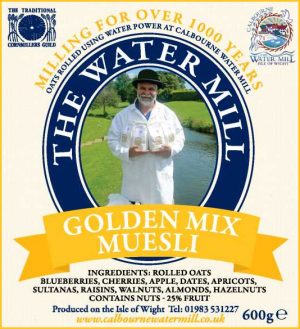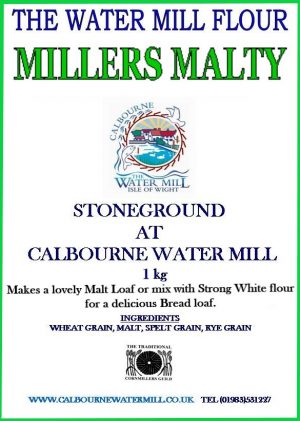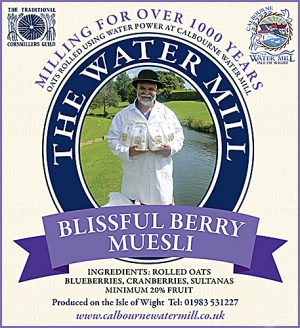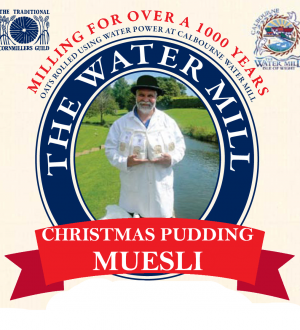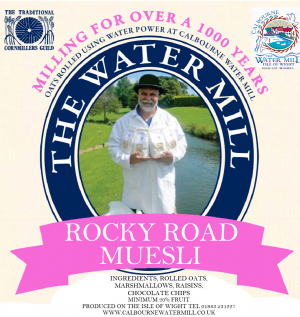School Visits To Calbourne Water Mill
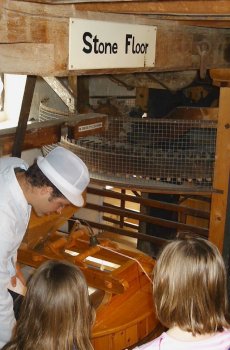 We have several choices for schools, please read the following options carefully and decide which would be most appropriate for your learners needs. We are sure that we can offer your party an exciting and interesting day out to remember.
We have several choices for schools, please read the following options carefully and decide which would be most appropriate for your learners needs. We are sure that we can offer your party an exciting and interesting day out to remember.
If you require further help information or just an informal chat please telephone 01983 531227 or email Calbourne Water Mill.
SCHOOL VISITS 2023
Option 1
Basic Visit, No tours and No guide.
£3 per student. Teachers/Adults Free
Option 2
A guided tour up to about 40 pupils.
(Groups are divided into small groups of 10-20)
£7 per student. Teacher/Adults Free.
Option 3
A guided tour, Milling demonstration and a Small gift bag to take home.
£10 per student. Teachers/Adults Free.
Option 3 includes:
- An in-depth Demonstration of milling using the water wheel. (adapted to the age group).
- World War Museum, home life Victorian Museum tour.
- Woodland walk, orchard and mill yard.
- Accompanying Adults free, complimentary cup of tea or coffee.
- Extras can include Golf- £2.50 per student.
Minimum amount of Students- 10.
We have an on site Café and Gift shop; we would respectfully ask that groups of children are supervised when visiting our café and gift shop.
Please contact us if your party requires Lunch or Tea or any other special arrangements, school parties may picnic in the grounds.
The Watermill
The Water Mill can provide a variety of learning experiences that will engage the children’s minds and provide an environment that can play a key role in supporting and extending development and learning. We can provide a variety of curricula opportunities for the full range of abilities to include:
- Communications, language and literacy
- Problem solving, numeracy and reasoning
- Knowledge and understanding of the world
- Physical development
- Creative development
Visits can be tailor made to your requirements and cover the full range of curricula studies to enhance and extend what is available within the classroom environment. We can work with you school to provide the level of work you require including the full spectrum of AEN needs including talented and gifted.
KSI and 2
Numeracy: use the mill and grounds to develop children’s abilities to process, represent and interpret data – e.g. weigh grain, flour, themselves; order of mass, calculate the speed of water using the mill stream and the wheel revolutions, calculate the number of eye a peacock has.
History: many opportunities to examine ‘Lives and Lifestyles’ (Past to present).
Use the various museums to place exhibits into chronological order and examine how we have progressed and help to understand the past. – War museum, Grandma’s kitchen, Granfer’s shed, Fire station and the Mill building. Study the different business uses of the mill over the last 1,000 years.
Science: wide variety of opportunities to investigate and problem solve – life processes, materials and properties and physical processes.
Different species of plants in a variety of locations to include SSI 2, meadow, ancient woodland, flood plain etc.
Energy: solar, wind and water and how they can be used.
Materials: uses of different types of wood and metals, also, oil from the café made into fuel for the tractors and mowers.
Many opportunities for problem solving activities using the mill and grounds. These can all be incorporated with the numeracy and literacy activities.
Geography: Wonderful opportunity for a locality study involving fieldwork.
Map the development of the area.
Use maps to explore the grounds with problem solving activities at each designated area.
Why the mill developed on the site and the usage over the last 1,000 years.
Comparative study – the mill with one in an ‘underdeveloped country’.
Environmental study – effect of mill on the area, land and water management.
PHSE: be aware of local effects of food grown locally and the number of miles food may travel – links with Design Tech and bread making using local wheat.
Literacy: wide range of opportunities, listening and responding, creative writing, discussion with staff, thank you letters etc.
KS3
Maths: use the mill grounds and buildings to bring maths to life, ratios, water flow, volumes, data collection and analysing.
Science: investigate and evaluate.
Alternative energy sources – wind, water, solar.
Conservation/management of the environment – use SSI site for habitats, energy flow, food cycles, water pollution.
Geography: Locality study – follow the stream from source to sea. Investigate the impact of managed and natural intervention on the stream.
History: as KS3 but in more depth, particularly the artefacts in the war museum.
Many opportunities to enhance the provision for gifted and talented and provide an environment that will allow for extension activities covering a range of topics.
KS4
Science: huge opportunity to cover many of the aspects of science options.
Applied – ‘Science in the work place’ – how bio diesel is made and used, alternative energy in the new buildings, as well as alternative sources.
Environmental – investigations into ancient woodland, moor, flood plain, including SSI 2 site and land management. Test the soil for ph, drainage, and nutrient content as well as examine flora and fauna in the grounds. An impressive variety in a small area. The chance to look at the animal care and diets of waterfowl, peafowl and chickens. Also, look at the management of orchards for fruit and wood.
Additional Science – investigation of The Water Mill’s use of energy/environment as a basis for individual study.
Business Studies: The Watermill as a tourist attraction. The business activities it might cover include units 1.1, 1.3, 1.4 and 1.8. Also units 3, Accounting and sustainability and 4 Marketing.
Leisure and Tourism BTech – particularly unit 2 – exploring customer service./p>
Enrichment Opportunities for Gifted and Talented, team building for the disengaged student, super learning day 7s to move D grades to C grades – both could take the form of ‘Ray Mears’ type activities. These can be tailored to individual schools needs.
There are ample opportunities for work at KS5 especially:
The sciences – environmental study of the stream, unique as the stream bed varies in a short distance giving rise for investigation o a wide range of hypothesis physics, alternative energy sources as well as feasibility studies for alternative energy.
Business studies
Leisure and Tourism.
As well as curricula opportunities the water mill could be used as a base for enterprise studies/projects for all ages using the water mill facilities – design, market and produce an article for sale and raise revenue for an agreed local/international charity. This would need to be in keeping with the mill ethos.


